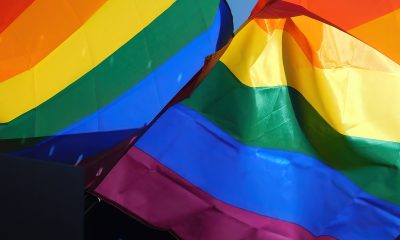a&e features
‘Drag Race’ season 11 champ Yvie on her tour, sisters, adventures, love life and more
Oddly and arch rival Silky now close as ‘sister
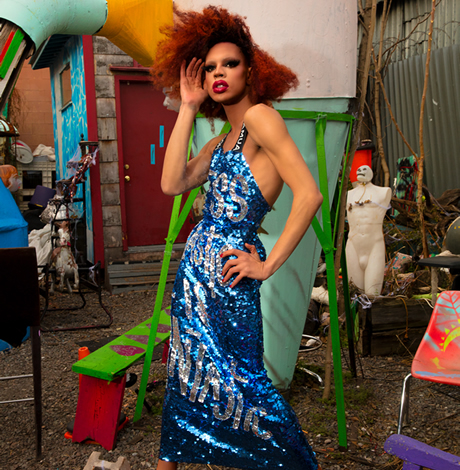
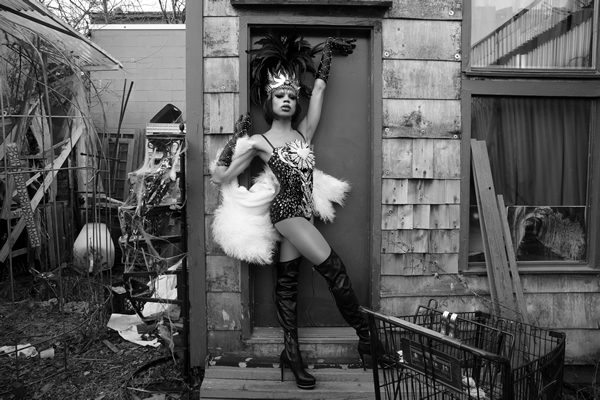
‘RuPaul’s Drag Race: Werq the World Tour’
Sunday, Oct. 27
8 p.m.
The Anthem
901 Wharf St., S.W.
$52-62
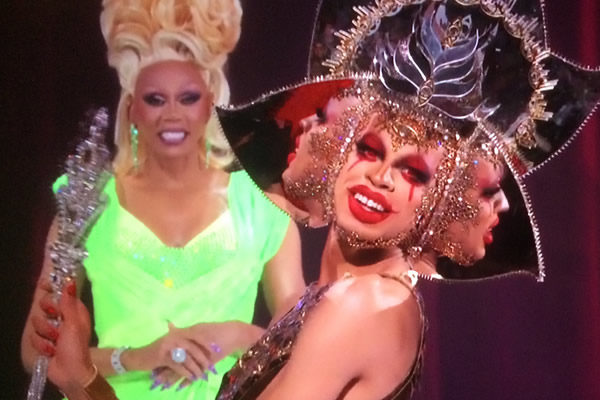
Boasting three season winners (Aquaria, Violet Chachki and Yvie Oddly), the 2019 “RuPaul’s Drag Race: Werq the World Tour” features one of the stronger lineups the franchise has ever launched.
Hosted by Michelle Visage, a “Drag Race” legend in her own right at the judge’s table, the show features “mission leader” Asia O’Hara on a journey to save the universe with the help of Detox, Monet Exchange, Naomi Smalls, Plastique, Kameron Michaels and Vanessa “Vanjie” Mateo. The tour comes to Washington Sunday night.
Yvie (aka Jovan Bridges), the 26-year-old 2019/season 11 “Drag Race” champ, unleashed her throaty trademark cackle liberally during a phone interview last week from Williamsville, N.Y. Her comments have been slightly edited for length.
WASHINGTON BLADE: How’s the tour going so far?
YVIE ODDLY: It’s really fun. It’s definitely been a challenge just trying to adapt my drag to a whole other thing on a crazy, massive scale, but I feel like I finally got the swing of things and it’s just a stellar show. It’s so much fun to be a part of. I love the girls, I love the people we work with and they feed me well (laughs).
BLADE: Any queens from other seasons you didn’t know before you’ve bonded with?
YVIE: Well, basically the whole cast. Up to this point, I’d only had the pleasure of working with Vanjie and Plastique so it’s been really cool to get one-on-one tme and hang out with a lot of the girls. I’d say the people I’ve probably gotten to know the best so far would be, like Naomi is really cool. I never would have imagined being friends with a pair of legs (laughs). I’ve also gotten along really well with Detox so far. I’m enjoying this experience.
BLADE: You’re also touring with two past season winners. Is there any unspoken deference to you three from the other girls?
YVIE: I mean I’d like to think that I could probably get away with more shit if I wanted to (laughs). Uh, but no. It really does just feel like all of the girls, as much as the competition is the thing that elevated our careers to this point and in a way brought us all together, that’s all behind us know and we’re just working queens all in the same field, all trying to make a living.
BLADE: What’s the drama meter like on tour vs. on the show? I’m sure you’re gonna say you’re all getting along great but c’mon — it’s drag, there has to be some drama right?
YVIE: It literally has been like zero. Sorry to be the wet blanket. There’s something about being in a competition environment and not having anybody you can talk to at home, not having a phone and being put in isolation that really will just rattle up the most human emotions out of everybody. When you’re in that environment, it’s super volatile at points, but on tour, we’re all just working queens. There literally hasn’t been almost anything.
BLADE: There was some controversy earlier this year when Monet X Change was fired from the “Haters Roast: the Shady Tour” after she bailed one of the dates to accept an offer from Madonna. How has this tour promoter (Voss) been like to work with for you and what would you do if Madonna called you to be ditch the tour to be in one of her videos?
YVIE: I love working with Voss. They’ve been producing things for a very long time and have the capability to put on some of the craziest, biggest shows and spectacles and they just treat me nice, they treat me well, that’s why I’m here. The Madonna video, that depends, is she asking me?
BLADE: Sorry, this is just hypothetical.
YVIE: Well that’s why I love working with Voss. I would never have to leave a tour to work on a Madonna video. They want my career to be as beautiful and blossoming as possible so they’d figure out a way to make it work.
BLADE: Did anything jump out at you watching your season on TV vs. how it felt in the moment?
YVIE: No. I typically have a pretty good idea of what’s going on around me at all moments (laughs). So literally the only thing that was surprising was hearing the other girl’s confessionals. That’s the only thing I wasn’t in the room for.
BLADE: You were quite abrasive at times. You said you were trying to be helpful but some were offended. Do you regret any of it?
YVIE: I don’t care whether or not I came across as abrasive. It’s something that many people value and many people don’t and that’s all on their plates. I just wanted to live authentically especially when I saw how inauthentic others were being and if it’s abrasive to tell the truth in a world that’s more comfortable telling lies outright then so be it, let me be that abrasive bitch.
BLADE: What was it like performing at Pride in Denver (your home town) fresh off your win in June?
YVIE: That was actually unimaginable. It felt like coming home from war. I know that’s a really intense comparison, but I had worked so hard to get on “Drag Race” to get my career to that point and I never thought, there’s one part of me that never really thought about what it would feel like to win or to lose or what any of it would feel like regardless. So after it all hit, so coming back home after making my city proud and being only the second person from Denver on the show I felt like what I imagine sports teams feel like when they win their championships (laughs).
BLADE: Are you still based in Denver?
YVIE: Yes I am.
BLADE: Do you plan to stay or are you considering moving to one of the coasts?
YVIE: I’m not moving to one of the coasts … at least as it stands right now, I really like the idea of being home when I’m home so if I’m only ever home for short amounts of time, then Denver is where I want to be.
BLADE: Overall what’s life been like since you won?
YVIE: It’s been like I’ve died and been reborn a thousands times. It really has. Not only am I trying so many different things that never thought I would try but I wake up literally in a different city every day, meet a whole bunch of new people every day and just have some of the most insane experiences, so I feel like since getting on “Drag Race” and definitely since airing and 100 percent since winning, I feel like every day is a crazy-ass rebirth (laughs).
BLADE: I’m trying to think how to ask this diplomatically: you have so much insane flexibility in your performances. Does that come in handy in your, um, romantic life or is it just for stage?
YVIE: (laughs) Unfortunately not. You know that whole adage about ladies in the street vs. in the sheets? I’m a freak on the streets and a blouse in the sheets.
BLADE: Your lip sync against Brooke Lynn Hytes in episode eight was so mind-bogglingly epic. What was it like in the moment? Did you realize she was really turning it out as well? And how did you feel when you found out you were both saved?
YVIE: I definitely was hyper focused on delivering the best performance I could, so while I didn’t necessarily see Brooke Lynn during any of our lip sync except for maybe one split second here or there, there’s something to be said about the energy of going and fighting for your chance to stay and fighting for your chance to continue being seen that just flips a switch on in you and Brooke Lynn up until that point was already the fiercest competitor around and the one person I really didn’t want to have to lip sync against, so when both of us were called for the bottom, I could just feel the energy going full throttle. I could feel Brooke Lynn fighting to stay too and I knew I had to put up a damn good fight if I wanted to be there beside her. That being said, I feel like the fans sometimes get into this mindset, like, “Oh it’s obviously going to be a double save” or, “These things are predictable,” to them but when we were there on that stage, I never even considered like the possibility of a double save. I just considered was I good enough to beat her, was I good enough to secure my place in this competition, and if not, am I ready to pack my bags? So getting called at the same time felt like some strange act of God, like some weird miracle, like, “Oh yeah, by the way, this doesn’t ever happen but merry Christmas.”
BLADE: How are you and Silky now? That was such a “Drag Race” rivalry for the ages.
YVIE: I mean Silky is probably one of the girls I’m closer to from the show just ‘cause we did go through so much shit with each other in the experience itself and then having to watch the fans relive that in a way, so even though I only ever get to see her occasionally, she’s my sister.
BLADE: You drew a lot of ire for your selfie policy. Sorry if I missed some of it, but was it more about you being exhausted after a show or did you not think it was fair to be taking a bunch of selfies after a show to the people who had paid for the meet and greet?
YVIE: My thinking on it is that I didn’t want people to be selfish for me. It was always about the fact that regardless of whether it’s for money or for my body or for whatever reason, if somebody says no, you just have to be respectful of that and I was getting so many people who started to get to a really creepy, unsettling level when I would tell them no. They would follow me back to my hotel room, they would like be berating me because they felt they deserved something for having watched me on TV (laughs). It’s just not how I feel. So when I made the initial tweets, it was out of frustration of people not listening to that. It was mostly because I’m tired, I’m fucking exhausted after a show, and people would rather believe it’s about money or it’s about me being some spoiled diva who wants all the fame fortune and none of the work that goes into it when really I never wanted fame and fortune, I wanted to be an artist and I feel like that’s who fans appreciate and respect. I’ve had plenty of people who love the hugs I’ve ben giving out (laughs) in place of bullshit selfies, which will just fade away into a timeline of, “Look at me and vaidate my life.”
BLADE: Bianca del Rio …. (cuts off; Bianca criticized Yvie’s policy)
YVIE: That grumpy old bitch. Whatever. That’s why I was shocked. I wasn’t shocked by fans being upset by what I said but I was shocked when she and a few other queens kind of jumped on the bandwagon because they chose to believe the most (inaudible) part about it and being a part of “Drag Race,” there’s always a deeper level that not everybody is going to read into or will even want to read into sympathetically and being like, “This life is hard.” She turns down photos with fans as well, instead of being, “Life is hard, sometime it’s OK to say no,” she was like this spoiled bitch who doesn’t want to take any photos but wants fame and fortune and she wants your money. So good on her, she can give as much terrible life advice as she wants.
BLADE: You said on the show because of your (genetic connective tissue disorder) condition you won’t be able to do drag forever. Any idea how long you might have for this? And what would you be doing if not drag?
YVIE: If I wasn’t doing drag, I’d still be creating. I was an artist before I found the medium of drag and I’ll be an artist afterwards. I have to create to survive, that’s just how I feel, the only way that I feel like I’m living my life authentically so I have had to think about that and remind myself that even if I can’t do things the way I’m doing them now, there is always a future, however I don’t have a timeline. … It’s just some days my body is there for me and some days it’s not and I know that if I keep doing drag the way I do it right now, there’s going to be a lot more of those not days.
BLADE: How long did it take to film season 11?
YVIE: It’s like a regular filming schedule, Monday-Friday, all hours of the day. I honestly don’t remember how long I was there for the whole time. I know it takes a few days to film an episode.
BLADE: Did you feel pressed for time during the competition?
YVIE: No. Only during the time challenges when they make it quite apparent how little you have of anything.
BLADE: Have you been watching “Drag Race U.K.”?
YVIE: Yes I have.
BLADE: Any thoughts or favorites?
YVIE: Um, it’s too early for me to call favorites, especially since what their queens offer is such a different dynamic from what we’ve seen in the U.S. seasons. However I’m just in love with some of the camp and wit that goes into their drag. I love a stupid bitch.
BLADE: It was announced you were gonna have your own World of Wonder show. When can we look for that?
YVIE: It’s actually called “Yvie’s Odd School” and it’s already out on the World of Wonder plus app. I think we’re like four episodes deep. Go check it out.
BLADE: You’ve released several singles. Would you like to establish a long-running music career?
YVIE: I mean it’s something I’d never considered prior to “Drag Race” but I’ve really enjoyed exploring it so it’s definitely one of the routes I’d like to take artistically.
BLADE: Had you auditioned before you got on “Drag Race”?
YVIE: It was my third time. The old third time’s the charm thing.
BLADE: Who was your favorite celebrity guest judge?
YVIE: Either Elvira — because she’s like everything, or Troye Sivan, because he saw my penis.
BLADE: Was that on the show? I don’t remember that.
YVIE: I think he said it on “Untucked.”
BLADE: Hmmmm, how did that happen? You weren’t shy about parading it around.
YVIE: I mean, it wasn’t a parade necessarily. I only had a certain amount of time to get my whole body pink and I didn’t have time when you’re under those constraints, you just don’t have time for decency or shyness (laughs). I guess he was just watching through one of those mirrors or something.
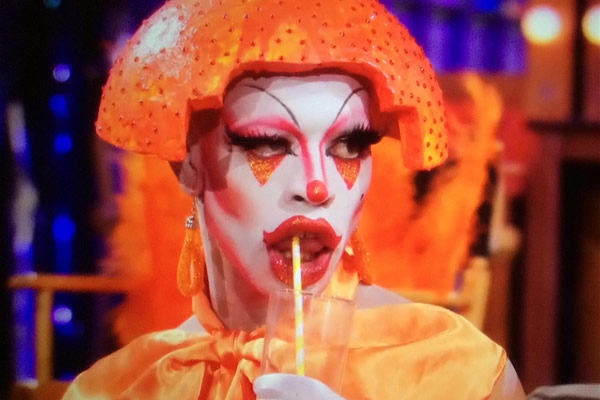
BLADE: Are you just naturally super thin or do you work out and watch your diet?
YVIE: I mean I live a super active lifestyle and always have. Way more active than honestly I probably should be. But I eat like crap (laughs) and my only exercise is drag
BLADE: Are you seeing anybody? What’s it like trying to date when you’re on the road so much?
YVIE: I actually have been dating the same guy since literally the week before our show started airing. I feel like I’ve been lucky because I’ve gotten to enter a relationship in the unique context of he didn’t know me before, so he doesn’t have any claims to my previous identity or what I was like before “Drag Race” and he didn’t come to know me through the medium or through the time when I was on TV, so he like never had any like fan girl moment or anything, he was there with me fright from the beginning, so it’s been magical to kind of get to know somebody authentically as myself and just ride this whole experience with him. To answer your second part, yes, it’s super hard.
BLADE: Does he live in Denver?
YVIE: That’s what makes it even harder. He moved to Boston to go to law school like right when I left for tour. I will be seeing him shortly.
BLADE: Is his name out there publicly?
YVIE: I mean, I’m not ashamed of him, but I don’t want to put him on blast like that.
BLADE: Thanks and good luck with the tour and your other endeavors, this was fun.
YVIE: Thank you darling.
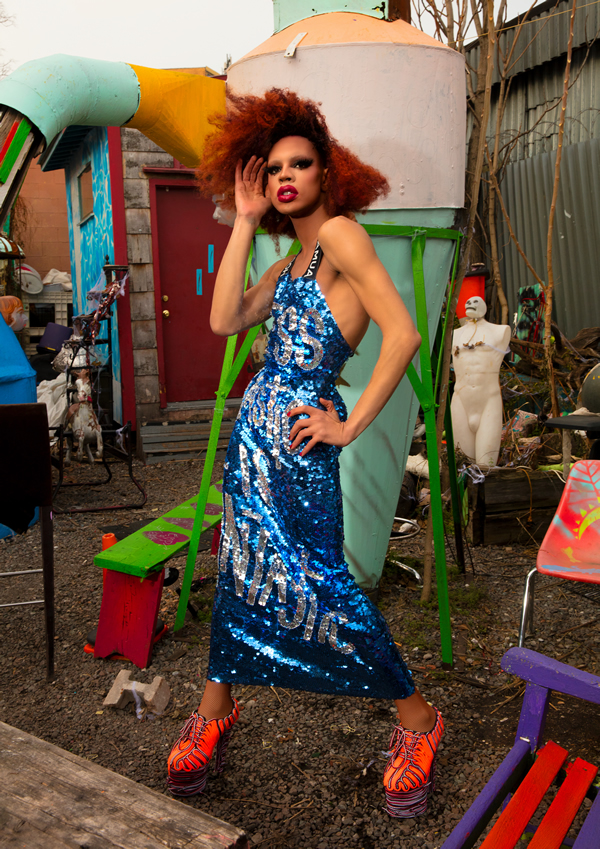
a&e features
Queer TV anchors in Md. use their platform ‘to fight for what’s right’
Salisbury’s Hannah Cechini, Rob Petree are out and proud in Delmarva
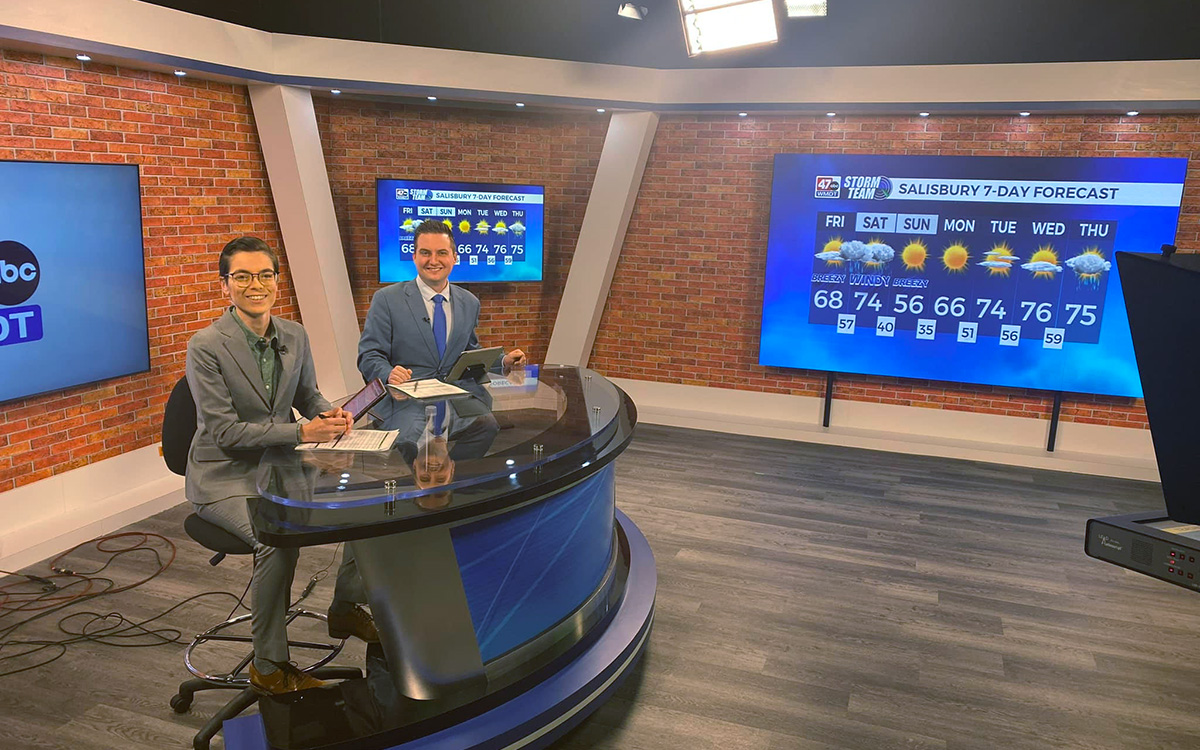
Identity can be a tricky thing for journalists to navigate. The goal of the job is to inform the public with no bias, but this is difficult, if not impossible, to do in practice. Everything from your upbringing to the books you read can impact how you view and cover the world. But sometimes these factors can help shine a light on an underrepresented community or issue.
Two broadcast journalists in Salisbury, Md., are using the subtle, yet impactful choice of sharing their queer identities to strengthen their reporting and connection to the community.
Hannah Cechini, who is non-binary, and Rob Petree, who is gay, co-host the 5:30-6:30 p.m. newscast for WMDT 47. They are the only known anchor team that are not only both queer, but also open out about their identities on air and, as Petree put it, “always use [their] platform and power that [we] have to fight for what’s right.”
Cechini’s passion for journalism played an important role in the discovery of their gender identity. They knew they were meant to be in the newsroom before they figured out they were non-binary.
“I was doing this job before I started to identify as non-binary,” Cechini told the Blade. “I’d always watch the evening news with my dad growing up and thought it was the coolest thing. And throughout high school, I worked on the school paper.”
After graduating from Suffolk University in Boston, Cechini’s passion for journalism only grew as they began to work in the world of news media, eventually ending up in Salisbury. As they honed their writing, editing, and anchoring skills at WMDT, Cechini also started to take an introspective look into their gender identity.
A little more than two years ago Cechini came out as non-binary to their coworkers in the newsroom and was met with support all around. “It was definitely smoother than I anticipated,” they said.
“It is very freeing to be able to do this job as a non-binary person because I haven’t really seen much of that representation myself.”
Petree, on the other hand, knew he was gay right around the same time he became interested in news media, at age 14. He started working for his high school news show and used it as a way to be open about his sexuality rather than hide it.
“I broke into broadcasting doing the morning announcements,” he said. “I did the weather and started doing a segment called issues and insights,” Petree said, explaining his introduction to the news. Eventually, students would ask him questions about his sexuality after seeing him on the school TV. “It had gotten to the point in school, that if you’re going to come up and ask me if I’m gay, well shit, I’m going to tell you!”
To him, this was the exact reason he had come out. Petree wanted to motivate others to live honestly.
“There are a lot of people who will spend most of their lives not being out so if they can see someone like me, who’s out and proud doing his thing, so to speak, then maybe that’s the inspiration for them,” Petree said. “To search their own soul, find out who they are, and live their full life.”
Petree explained that he got his start in a space that was not always welcoming to his queerness. This tested the delicate balance between being a journalist and holding your identity close.
“I’ve always been out and it was a challenge because I got my start in conservative talk radio,” Petree said. “I’m going to be honest, some of the things I heard from people I’ve worked with, from the callers to the radio stations were absolutely abhorrent. But I never let it discourage me. It made me work that much harder.”
Cechini highlighted the same sentiment when explaining why it’s important to have out LGBTQ figures in news media. They want to show everyone that it is possible to be openly queer and successful.
“I just think that representation matters because if ‘Joe,’ who’s never seen a transgender person before, sees a transgender person or a non-binary person, doing a job that they’ve only ever seen straight cis people doing before, it kind of creates that understanding or bridges that gap,” Cechini said. “It’s like, ‘OK, maybe they’re not that different from me.’ And that facilitates being able to connect among different communities.”
Both Cechini and Petree agree that having a queer coworker has made their bond stronger.
“It’s great to have someone else next to me who I can relate to and work alongside,” Petree said. “And they’re a joy to work with, they really are. There is a tremendous amount of things that we relate to together — like we both share and have the same affinity for Lady Gaga,” he said laughing. “Although they’re more of a Lady Gaga fan than I am.”
“Hannah is a tremendous journalist who really goes out of their way to make sure that the stories that they do are on point 100% of the time,” he added. “They’ve been great to work with and to learn from and to grow alongside. I’m very happy to have them as my co-anchor.”
Cechini explained that the relationship between two co-anchors can make or break a newscast, and having Petree as their partner on air is a major part of the show’s success.
“Co-anchoring is not just the relationship that you have on camera,” Cechini said. “It’s really, really important to have a good relationship with your co-anchor off-camera as well because you have to have a level of trust between you.”
Cechini continued, saying that this relationship is crucial to working together, especially when things don’t go as planned.
“Not everything always goes to script,” they said. “Sometimes you have to be able to work together without even really talking to each other and just kind of know what to do. When you have a relationship like that with someone who identifies similarly to you or has had similar life experience, I think that just only strengthens that [relationship].”
Although they have had similar experiences being from the LGBTQ community, Petree said it was a change for him to use “they/them” pronouns on air.
“Prior to working with Hannah, I’ve never worked with a non-binary individual who went by the pronouns ‘they/them,’” Petree said. “It was new for me to not use traditional pronouns on air, but I can say that I have never misgendered them on air and never will. You get conditioned to using traditional pronouns and it’s easy to make that mistake, but I never have.”
At the end of the day, they both explained, it is about doing the job right. For the duo, a part of that is understanding the diversity of people and issues in the community.
“When you come from a more marginalized community, I think that kind of helps to inform you a little better as a journalist because you have a better understanding of what it’s like to be ‘the other guy,’” Cechini said.
“Our talent and our drive for journalism speaks for itself,” Petree said. “And that resonates with people. Have we shown ourselves to be an inspiration to the LGBTQ+ community here in Delmarva? Yes, we have. And that’s something that I’m proud of.”
The primetime nightly newscast with Hannah Cechini and Rob Petree airs weeknights from 5:30-6:30 p.m. on ABC affiliate WMDT 47.
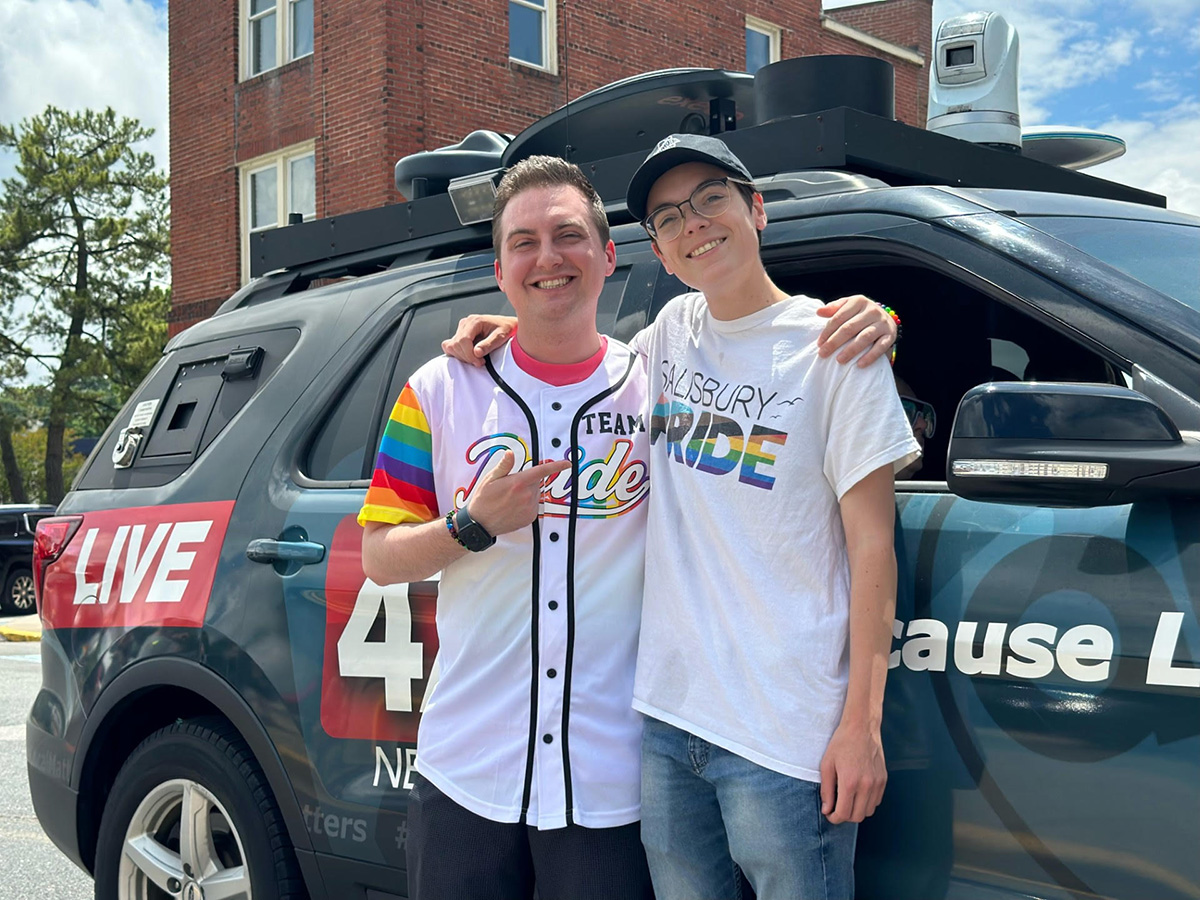
a&e features
‘Queering Rehoboth Beach’ features love, loss, murder, and more
An interview with gay writer and historian James T. Sears
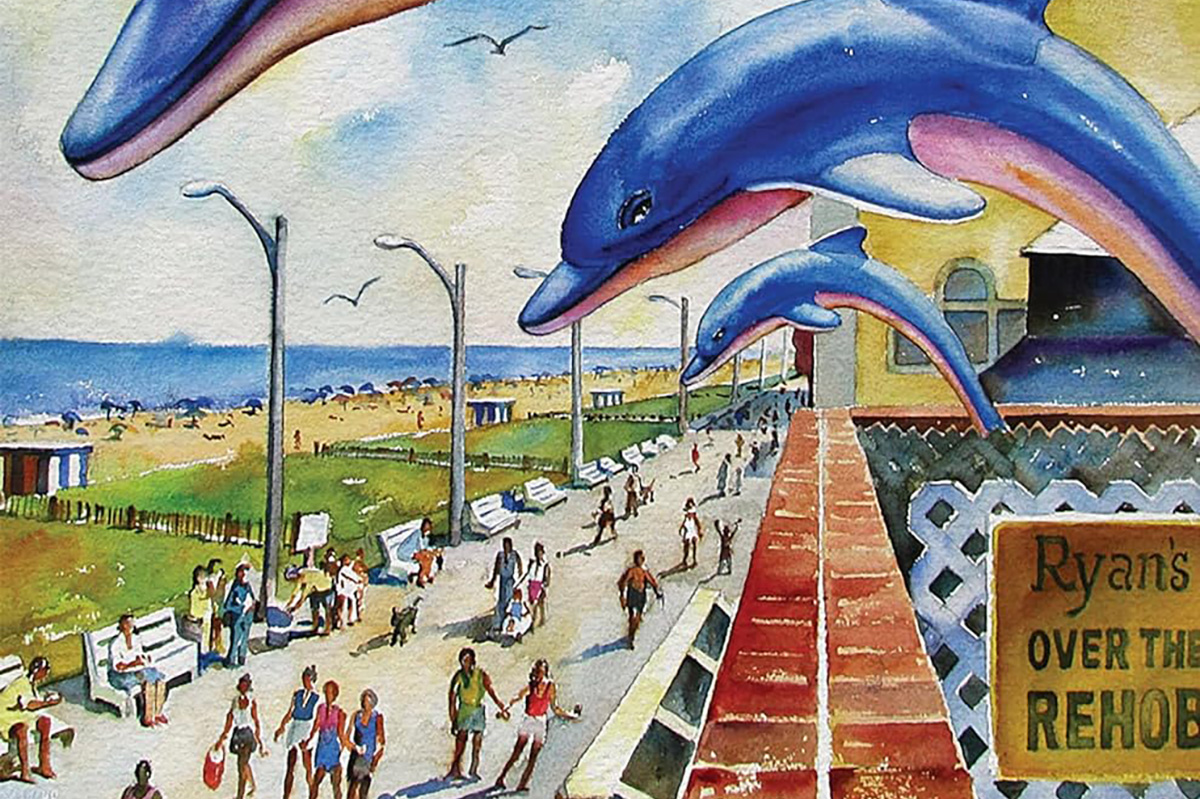
James T. Sears book talk
Saturday, June 29, 5 p.m.
Politics & Prose
5015 Connecticut Ave., N.W.
When it comes to LGBTQ summer destinations in the Eastern time zone, almost everyone knows about Provincetown, Mass., Fire Island, N.Y., and Key West, Fla. There are also slightly lesser known, but no less wonderful places, such as Ogunquit, Maine, Saugatuck, Mich., and New Hope, Pa. Sandwiched in between is Rehoboth Beach, Del., a location that is popular with queer folks from D.C., Maryland, Virginia, Pennsylvania, and New Jersey. The dramatic and inspiring story of how Rehoboth Beach came to be what it is today can be found in gay historian James T. Sears’s revealing new book “Queering Rehoboth Beach: Beyond the Boardwalk” (Temple University Press, 2024). As educational as it is dishy, “Queering Rehoboth Beach” provides readers with everything they need to know (and possibly didn’t realize they needed to know) about this fabulous locality. Sears was kind enough to make time to answer a few questions about the book.

WASHINGTON BLADE: James, it’s been a few years since I’ve interviewed you. The last time was in 1997 about your book “From Lonely Hunters to Lonely Hearts: An Oral History of Lesbian and Gay Southern Life.” At the time, you were living in Columbia, S.C. Where are you currently based, and how long have you been there?
JAMES T. SEARS: It has been great reconnecting with you. After that book, we moved to Charleston, S.C. There I wrote several more books. One was about the Mattachine group, focusing on one largely misunderstood leader, Hal Call. Another book shared reminisces of a 90-year-old gentleman, the late John Zeigler, interweaving his diaries, letters, and poetry to chronicle growing up gay in the South at the turn of the last century. From there I moved to Central America where I chronicled everyday queer life and learned Spanish. We returned several years ago and then washed up on Rehoboth Beach.
BLADE: In the introduction to your new book “Queering Rehoboth Beach: Beyond the Boardwalk” (Temple University Press, 2024), you write about how a “restaurant incident” in Rehoboth, which you describe in detail in the prologue, became a kind of inspiration for the book project. Please say something about how as a historian, the personal can also be political and motivational.
SEARS: I want to capture reader’s interest by personalizing this book more than I have others. The restaurant anecdote is the book’s backstory. It explains, in part, my motivation for writing it, and more crucially, introduces one meaning of “queering Rehoboth.” That is, in order to judge this “incident”—and the book itself—we need to engage in multiple readings of history, or at least be comfortable with this approach. I underscore that what is accepted as “history”—about an individual, a community, or a society—is simply a reflection of that era’s accepted view. Queering history challenges that consensus.
BLADE: Who do you see as the target audience for “Queering Rehoboth Beach?”
SEARS: Well, certainly if you have been to Rehoboth or reside there, this book provides a history of the town—and its queering—giving details that I doubt even locals know! Also, for those interested in the evolution of other East Coast queer resorts (Ptown, Fire Island, Key West) this book adds to that set of histories. My book will also be of interest to students of social change and community organizing. Most importantly, though, it is just a good summer read.
BLADE: “Queering Rehoboth Beach” features numerous interviews. What was involved in the selection process of interview subjects?
SEARS: I interviewed dozens of people. They are listed in the book as the “Cast of Narrators.” Before these interviews, I engaged in a systematic review of local and state newspapers, going back to Rehoboth’s founding as a Methodist Church Camp in 1873. I also read anecdotal stories penned by lesbians and gay men. These appeared in local or regional queer publications, such as Letters from CAMP Rehoboth and the Washington Blade. Within a year, I had compiled a list of key individuals to interview. However, I also interviewed lesbians, gay men, transgender individuals, and heterosexuals who lived or worked in Rehoboth sometime during the book’s main timeframe (1970s-2000s). I sought diversity in background and perspective. To facilitate their memories, I provided a set of questions before we met. I often had photos, letters, or other memorabilia to prime their memories during our conversation.
BLADE: Under the heading of the more things change, the more they stay the same, the act of making homosexuality an issue in politics continues to this day. What do you think it will take for that to change?
SEARS: You pose a key question. Those who effectuated change in Rehoboth — queers and progressive straights — sought common ground. Their goal was to integrate into the town. As such, rather than primarily focus on sexual and gender differences, they stressed values held in common. Rather than proselytize or agitate, they opened up businesses, restored houses, joined houses of worship, and engaged in the town’s civic life.
To foster and sustain change, however, those in power and those who supported them also had to have a willingness to listen, to bracket their presuppositions, and to engage in genuine dialogue. Violent incidents, especially one on the boardwalk, and the multi-year imbroglio of The Strand nightclub, gradually caused people to seek common ground.
That did not, however, come without its costs. For some — long separated from straight society — and for others — unchallenged in their heteronormativity — it was too great of a cost to bear. Further, minorities within the queer “community,” such as people of color, those with limited income, and transgender individuals, never entered or were never invited into this enlarging public square.
The troubles chronicled in my book occurred during the era of the “Moral Majority” and “Gay Cancer.” Nevertheless, it didn’t approach the degree of polarization, acrimony, fake news, and demagoguery of today. So, whether this approach would even be viable as a strategy for social change is debatable.
BLADE: In recent years, there has been a proliferation of books about LGBTQ bars, a subject that is prominent in “Queering Rehoboth Beach.” Was this something of which you were aware while writing the book, and how do you see your book’s place on the shelf alongside these other books?
SEARS: Queering heterosexual space has been a survival strategy for generations of queer folks. These spaces — under-used softball fields, desolate beaches, darkened parks, and out-of-the-way bars — are detailed in many LGBTQ+ books, from the classic, “Boots of Leather, Slippers of Gold,” to the recently published “A Place of Our Own” and “The Bars Are Ours.” Of course, these spaces did not encompass the kaleidoscope of queer life, but they provide us a historical gateway into various segments of a queer community and culture.
This was certainly true for my book. Unsurprisingly, until The Strand controversy, which began in 1988, all of Rehoboth’s queer bars were beyond the town limits. There were, however, homosexual watering holes in the liminal sexual space. For instance, you had the Pink Pony on the boardwalk during the 1950s and the Back Porch Café during the 1970s. So, in this sense, I think “Queering Rehoboth Beach” fits well in this ever-enlarging canon of queer history.
BLADE: As one of the most pro-LGBTQ presidents in U.S. history, how much, if it all, did the Biden Delaware connection have to do with your desire to write “Queering Rehoboth Beach?”
SEARS: It is just a coincidence. Interestingly, as I was researching this book, I came across a 1973 news story about Sen. Joe Biden speaking at a civic association meeting. One of the 30 or so residents attending was James Robert Vane. The paper reported the senator being “startled” when Vane questioned him about the ban on homosexuals serving in the U.S. civil service and military. Uttering the familiar trope about being “security risks,” he then added, “I admit I haven’t given it much thought.” In Bidenesque manner, he paused and then exclaimed, “I’ll be darned!”
Biden was a frequent diner at the Back Porch Café, often using the restaurant’s kitchen phone for political calls. Like the progressives I spoke about earlier, he had lived in a heteronormative bubble—a Catholic one at that! Yet, like many in Rehoboth, he eventually changed his view, strongly advocating for queer rights as Vice President during the Obama administration.
BLADE: How do you think Rehoboth residents will respond to your depiction of their town?
SEARS: Well, if recent events are predictive of future ones, then I think it will be generally positive. My first book signing at the locally owned bookstore resulted in it selling out. The manager did tell me that a gentleman stepped to the counter asking, “Why is this queer book here?”— pointing to the front table of “Beach Reads.” That singular objection notwithstanding, his plan is to keep multiple boxes in stock throughout the summer.
BLADE: Over the years, many non-fiction and fiction books have been written about places such as Provincetown, Fire Island, and Key West. Is it your hope that more books will be written about Rehoboth Beach?
SEARS: My hope is that writers and researchers continue to queer our stories. Focusing on persons, events, and communities, particularly micro-histories, provides a richer narrative of queer lives. It also allows us to queer the first generation of macro-histories which too often glossed over everyday activists. So, as the saying goes, let a thousand flowers bloom.
BLADE: Do you think that “Queering Rehoboth Beach” would make for a good documentary film subject?
SEARS: Absolutely, although probably not on the Hallmark Channel [laughs]! It would make an incredible film — a documentary or a drama — even a mini-series. Because it focuses on people: their lives and dreams, their long-running feuds and abbreviated love affairs, their darker secrets, and lighter moments within a larger context of the country’s social transformation. “Queering Rehoboth Beach” details the town’s first gay murder, the transformation of a once homophobic mayor, burned-out bars, and vigilante assaults on queers, the octogenarian lesbian couple, living for decades in Rehoboth never speaking the “L word,” who die within months of one another. It, too, is a story of how the sinewy arms of Jim Crow affected white Rehoboth — gay and straight. In short, “Queering Rehoboth Beach” is about a small beach town, transformed generation over generation like shifting sands yet retaining undercurrents of what are the best and worst in American life and culture.
BLADE: Have you started thinking about or working on your next book?
SEARS: The manuscript for this book was submitted to the publisher more than a year ago. During that time, I’ve been working on my first book of fiction. It is a queer novel set in early nineteenth century Wales against the backdrop of the Napoleonic wars and industrialization. I want to transport the reader into an era before the construction of homosexuality and at the inception of the women’s movement. How does one make meaning of sexual feelings toward the same gender or about being in the wrong gender? In the process of this murder mystery, I integrate Celtic culture and mythology and interrogate how today’s choices and those we made in the past (and in past lives) affect our future and those of others.
The Blade may receive commissions from qualifying purchases made via this post.
a&e features
D.C. Latinx Pride seeks to help heal the community
Much history lost to generations of colonialism
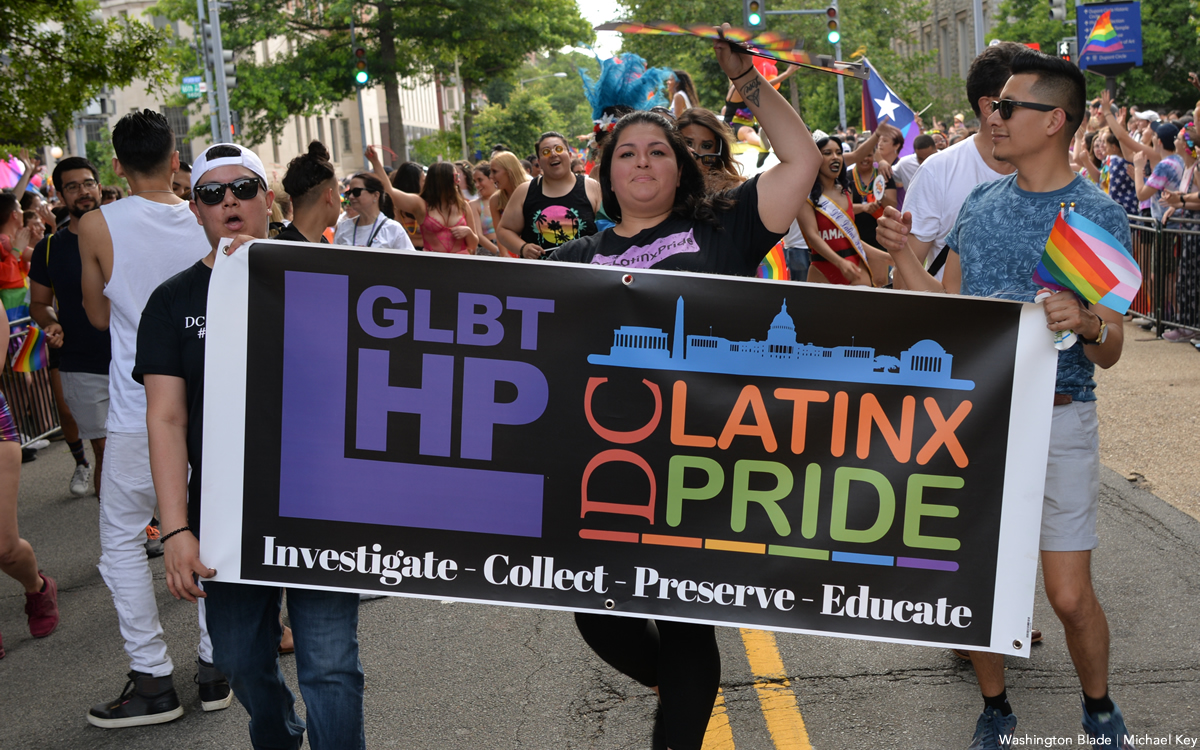
The Latinx History Project will host its 18th annual Latinx Pride with a series of 11 events this year.
Latinx History Project, or LHP, was founded in 2000 to collect, preserve and share Latinx LGBTQ+ History. Six years later, they began hosting DC Latinx Pride.
Board member Dee Tum-Monge said organizers saw a need for the event that centered Latinx community members.
“LHP knows our queer history as Latinx folks has most often been lost to generations of colonialism and imperialism,” they said. “Which is why we focus on documenting and highlighting the impact our community has in D.C. and beyond.”
According to UCLA School of Law, there are more than two million Latinx LGBTQ adults that live in the U.S.
“Events specifically for the Latinx community are important not only to make our experience visible but also to create spaces where we can grow closer with other groups and each other,” said Tum-Monge.
This year they kicked off DC Latinx Pride with a crowning ceremony for their royal court on May 31.
Their three-part series, “La Sanación”, is underway with part two planned for June 16.
“Sanación in Spanish means ‘healing’ which is a big part of what we want to bring to Pride,” said Tum-Monge. “Our communities go through a lot of trauma and hate, but we know there’s more to us. Our goal is to foster connection with ourselves, nature, community, and spirituality.”
In conjunction with the series there is a slate of other events; tickets can be purchased at latinxhistoryproject.org/pride.
In addition, Latinx Pride will march in the Capital Pride Parade on Saturday and participate in the festival on Sunday. To stay involved with Latinx History Project after Pride and hear more about future events visit latinxhistoryproject.org.
-

 Canada1 day ago
Canada1 day agoToronto Pride parade cancelled after pro-Palestinian protesters disrupt it
-

 Theater4 days ago
Theater4 days agoStephen Mark Lukas makes sublime turn in ‘Funny Girl’
-

 Baltimore3 days ago
Baltimore3 days agoDespite record crowds, Baltimore Pride’s LGBTQ critics say organizers dropped the ball
-

 Sports4 days ago
Sports4 days agoHaters troll official Olympics Instagram for celebrating gay athlete and boyfriend



